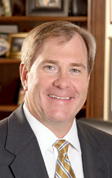College football has finally started back, and it couldn’t have come soon enough! Football is a way of life here in Alabama. Only family and God are more important.
That’s why I was so troubled a few weeks ago when the Freedom From Religion Foundation (FFRF) sent a letter to Auburn University asking them to “abolish the chaplaincy” in Auburn’s athletic department. I feel so strongly about this that I am introducing legislation, which will be named after Auburn’s chaplain, Chette Williams, in this special legislative session to protect chaplains at all our public schools.
The FFRF has claimed that it’s unconstitutional for public schools to have chaplains in their athletic departments, even if the chaplains are volunteers, arguing that coaches use chaplains to “impose religion” on their players.
I respect everyone’s right to practice their faith, regardless of what their faith may be. I served 14 years in the military, in part, to defend that right. But there’s a difference between respecting the freedom of religion and excluding religion.
I’ve spent most of my life around chaplains. I played college football, where we had a chaplain. My uncle, Danny Ford, didn’t have a team chaplain on staff, but groups like the Fellowship of Christian Athletes (FCA) were very involved and did have staff that could work with his players. One of his former players, James Trapp, served as chaplain at Clemson University for many years before taking a chaplain position in the NFL.
In the military, we had chaplains of different religious faiths. College fraternities and sororities have chaplains, as well as high school classes and most civic clubs and organizations.
Chaplains have been around since before our constitution was written, and they serve a vital role-especially for young men and women who are leaving home for the first time to go to college.
Yes, chaplains can provide religious-based advice to these kids. But chaplains don’t force kids to participate in religious activities against their will. When chaplains do offer spiritual advice, it’s because the student asked specifically for religious advice.
When we watch Auburn or Alabama play football, it can be easy to forget that many of these kids are just 18 and 19 years old. Most of them are away from their parents or loved ones for the first time in their lives. On top of that, they are under intense pressure from their coaches, professors and fans to perform at a higher level athletically and academically than they ever have before.
These kids are under tremendous stress and pressure, and they need a mentor figure other than their coaches and professors to be there and support them. They need someone to listen to them and be a shoulder to cry on, or just to encourage them and care about them.
In Mark 12:31, Jesus commanded all of us to love each other as we love ourselves, and that is what these chaplains offer these student-athletes. When Jesus walked this earth, all he did was help people. But then those people killed him for no reason. Two thousand years later, it’s now the chaplains who are being targeted, and all they’ve done is try to help these kids.
Chaplains show these kids that, no matter how tough things may seem, there is someone there who loves and supports them. When you’re away from mom and dad, when you’re struggling in your classes, when your coaches are pushing you to push yourself, that chaplain is there to be an ear or a shoulder to cry on. For that 18 or 19 year-old kid who’s on his or her own for the first time in their life – usually in a new and sometimes scary environment – that chaplain is essential.
It’s not about convincing kids to be Christian or to practice a particular religion. It’s about supporting these kids and offering them a safe place where they can go when they are experiencing some of the most stressful times of their lives.
Students are always free to choose not to participate in religious activities. But those kids who do want that religious guidance from someone who is there everyday and knows what he or she is going through should have access to a chaplain.
I sincerely believe in the freedom of religion. But removing chaplains isn’t protecting students from being pressured to participate in religious activities; it’s denying students access to a mentor.
That is why I am proud to sponsor the “Reverend Chette Williams Act” to protect every school’s right to have a chaplain.
Craig Ford is a Democrat from Gadsden and the Minority Leader in the Alabama House of Representatives.





